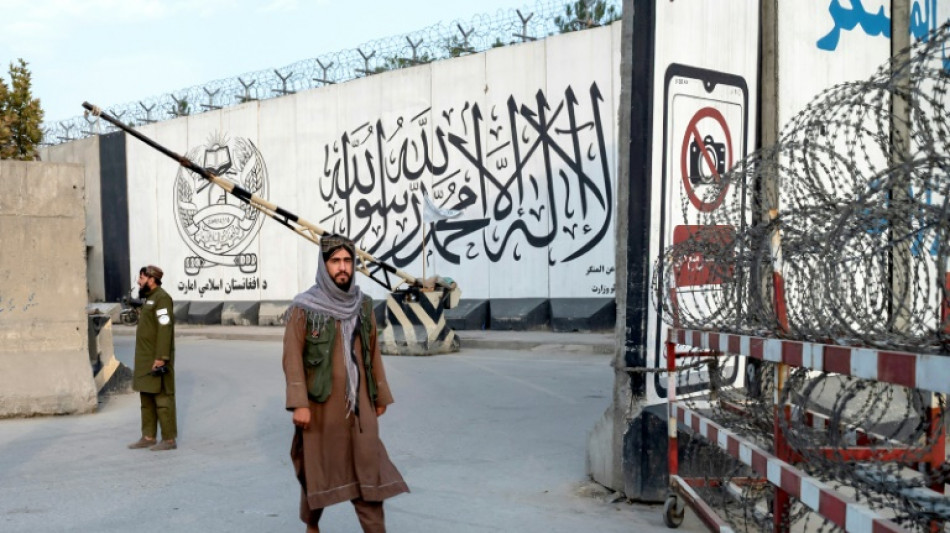
-
 Australian museum recovers Egyptian artefacts after break-in
Australian museum recovers Egyptian artefacts after break-in
-
India forced to defend US trade deal as doubts mount

-
 Bitter pill: Taliban govt shakes up Afghan medicine market
Bitter pill: Taliban govt shakes up Afghan medicine market
-
Crunch time for Real Madrid's Mbappe-Vinicius partnership

-
 Rio Carnival parades kick off with divisive ode to Lula in election year
Rio Carnival parades kick off with divisive ode to Lula in election year
-
Nepal 'addicted' to the trade in its own people
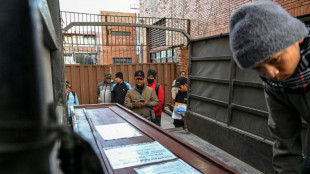
-
 Asian markets sluggish as Lunar New Year holiday looms
Asian markets sluggish as Lunar New Year holiday looms
-
'Pure extortion': foreign workers face violence and exploitation in Croatia

-
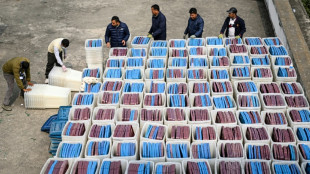 Nepal launches campaigns for first post-uprising polls
Nepal launches campaigns for first post-uprising polls
-
What to know as South Korea ex-president Yoon faces insurrection verdict

-
 'Train Dreams,' 'The Secret Agent' nab Spirit wins to boost Oscars campaigns
'Train Dreams,' 'The Secret Agent' nab Spirit wins to boost Oscars campaigns
-
Rubio visits Trump's 'friend' Orban ahead of Hungary polls

-
 Kim unveils housing block for North Korean troops killed aiding Russia: KCNA
Kim unveils housing block for North Korean troops killed aiding Russia: KCNA
-
Accused Bondi killer Naveed Akram appears in court by video link

-
 Art and the deal: market slump pushes galleries to the Gulf
Art and the deal: market slump pushes galleries to the Gulf
-
Job threats, rogue bots: five hot issues in AI
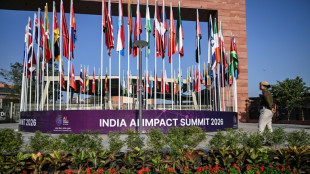
-
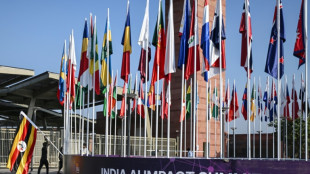 India hosts AI summit as safety concerns grow
India hosts AI summit as safety concerns grow
-
'Make America Healthy' movement takes on Big Ag, in break with Republicans

-
 Tech is thriving in New York. So are the rents
Tech is thriving in New York. So are the rents
-
Young USA Stars beat Stripes in NBA All-Star tourney final

-
 New anti-government chants in Tehran after giant rallies abroad: reports
New anti-government chants in Tehran after giant rallies abroad: reports
-
'The Secret Agent' nabs Spirit Awards win in boost to Oscars campaign

-
 Brignone wins second Milan-Cortina gold as Klaebo claims record ninth Olympic crown
Brignone wins second Milan-Cortina gold as Klaebo claims record ninth Olympic crown
-
Morikawa wins at Pebble Beach despite Scheffler heroics

-
 Germany's Hase and Volodin tango to Olympic pairs figure skating lead
Germany's Hase and Volodin tango to Olympic pairs figure skating lead
-
Rayo thrash Atletico who 'deserved to lose' as Betis cut gap

-
 Napoli salvage point after Malen twice puts Roma ahead
Napoli salvage point after Malen twice puts Roma ahead
-
Lyon down Nice to boost Ligue 1 title bid with 13th straight win

-
 LeBron still unclear on NBA future: 'I have no idea'
LeBron still unclear on NBA future: 'I have no idea'
-
Shelton battles back from brink to beat Fritz, take Dallas crown

-
 Great Britain celebrate best-ever Winter Olympics
Great Britain celebrate best-ever Winter Olympics
-
Brignone wins second Milan-Cortina gold as Klaebo claims record ninth

-
 Arteta concerned over Arsenal's mounting injury list
Arteta concerned over Arsenal's mounting injury list
-
In fuel-starved Cuba, the e-tricycle is king

-
 Shaidorov still spinning after outshining Malinin for Olympic gold
Shaidorov still spinning after outshining Malinin for Olympic gold
-
Late Gruda goal grabs Leipzig draw versus Wolfsburg

-
 'Ultra-left' blamed for youth's killing that shocked France
'Ultra-left' blamed for youth's killing that shocked France
-
Canada wrap up perfect Olympic ice hockey preliminary campaign

-
 Historical queer film 'Rose' shown at Berlin with call to action
Historical queer film 'Rose' shown at Berlin with call to action
-
Wales' Tandy tips hat to France after Six Nations hammering

-
 Quadruple chasing Arsenal rout Wigan to reach FA Cup fifth round
Quadruple chasing Arsenal rout Wigan to reach FA Cup fifth round
-
2026 S-Class starry facelift

-
 What they said as India beat Pakistan at T20 World Cup - reaction
What they said as India beat Pakistan at T20 World Cup - reaction
-
Away-day blues: England count cost of Scotland Six Nations defeat

-
 'Wuthering Heights' debuts atop North America box office
'Wuthering Heights' debuts atop North America box office
-
Rayo thrash Atletico who 'deserved to lose'

-
 Kok beats Leerdam in Olympic rematch of Dutch speed skaters
Kok beats Leerdam in Olympic rematch of Dutch speed skaters
-
India rout bitter rivals Pakistan by 61 runs at T20 World Cup

-
 France run rampant to thrash sorry Wales 54-12 in Six Nations
France run rampant to thrash sorry Wales 54-12 in Six Nations
-
Rio to kick off Carnival parade with ode to Lula in election year


Afghanistan morality ministry spreads 'living things' images ban
Afghanistan's morality ministry is gradually introducing a ban on images of living beings in media, with multiple provinces announcing restrictions and some Taliban officials refusing to be photographed or filmed, journalists across the country told AFP.
Since mid-October the Ministry for the Propagation of Virtue and the Prevention of Vice (PVPV) has held meetings with journalists in one province after another.
They informed media workers that a ban on taking and publishing images of living things -- namely people and animals -- from a recent "vice and virtue" law would be gradually implemented.
Television was completely banned under the Taliban's previous stint in power from 1996 to 2001, but a similar edict had not been imposed since they ousted the Western-backed government three years ago.
Enforcement of many articles of the "vice and virtue" law, which codifies the Taliban government's strict interpretation of Islamic law and includes sweeping codes of behaviour, has been uneven.
But journalists expressed concern over the possibility of a full crackdown, which would make Afghanistan the only Muslim-majority country to impose such bans.
"I have a very bad feeling about it -- taking photos and images is an inseparable part of journalism," a journalist in central Daikundi province told AFP, asking not to be named for fear of repercussions.
He said media in Daikundi had only been allowed to record audio at events following a recent PVPV announcement.
"Besides that, with the full implementation of this rule, many people working in the media will lose their jobs," he added.
A full ban has not been imposed yet, however, and many ministries and government officials in Kabul have continued to post pictures of people.
"It seems the supreme leader (Hibatullah Akhundzada) and his allies in Kandahar want to apply the Taliban policy of the '90s, when images of living beings were forbidden," South Asia Desk head for Reporters Without Borders (RSF), Celia Mercier, told AFP.
But "some Taliban officials seem to not necessarily agree with these new restrictions", she said.
"And imposing more restrictions may lead to discontent among the population already affected by the ban on school for young girls, women's rights and many other measures."
- 'Implemented gradually' -
PVPV has been spearheading a campaign to bring the law into force.
On October 14, the ministry's spokesman Saiful Islam Khyber said the ban on images of living things "applies to all Afghanistan... and it will be implemented gradually".
Since then, multiple events announced by Taliban officials -- primarily from PVPV but also from other ministries and governor offices, as well as some private events -- have explicitly barred photography and filming.
On Wednesday, PVPV officials in the populous eastern province of Nangarhar told journalists that "every article of the law is determined by the light of Islam and all are obliged to implement it".
Journalists in southern Helmand on Friday told AFP they had also been warned against taking photos and videos of living things.
In Kabul, the PVPV ministry invited media to attend a meeting with community leaders -- similar to those held in five other provinces -- where only audio recording was allowed, and journalists were told to put their phones away.
An organiser of a gathering in northern Badakhshan to honour the recently killed Palestinian Hamas chief told AFP the event was cancelled in part because PVPV officials had objected to Yahya Sinwar's image on a poster.
And in neighbouring Takhar province, at least two provincial TV channels stopped broadcasting living things in mid-October, instead showing logos and landscapes with audio.
The information ministry has not responded to requests for comment.
- Different times -
Three years since the Taliban's takeover, Afghanistan has slipped 56 places to 178th out of 180 countries in RSF's global ranking for press freedom.
Officials in the Taliban heartland of southern Kandahar had long been barred from taking photos and videos at events.
More recently in August, the Kandahar branch of state-run news programme RTA stopped broadcasting provincial news after the new law was announced, according to an RSF report published Thursday.
Major Afghan broadcaster Tolo News continues to show people and animals, as does the national broadcast of RTA.
While Mercier warned there was "a real fear there will one day be a total ban in the country", she noted that times have changed since the Taliban's first rule, with smartphones and TVs now ubiquitous.
"What is quite paradoxical is that we see the Taliban leaders using audiovisual media to communicate and promote themselves," she said.
Still some others appear to be adhering -- the spokesman for the higher education ministry has posted only pictures of buildings and landscapes since October 3.
F.Schneider--AMWN